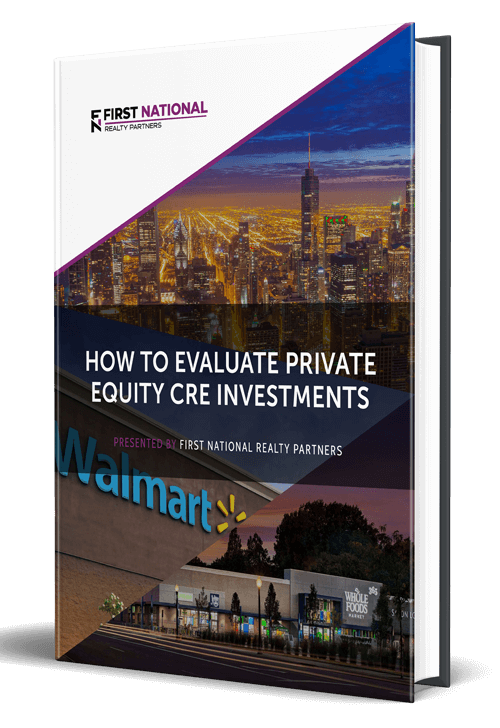At First National Realty Partners, we have a saying that you “make your money on the buy.” This means that the price paid to purchase a commercial property is one of the primary factors in whether or not the outcome is profitable. Pay too much for a property, no matter how good it is, and it can be very difficult to hit the desired profitability metrics. But, determining the property’s fair value as part of a broader investment strategy is easier said than done because there are multiple types of property value, all of which mean something slightly different.
In this article, we are going to discuss one particular type of value, known as Investment Value. We will describe what it is, why it is important, how it is calculated, and how it is used in the context of a real estate transaction. By the end, readers will have the information needed to calculate Investment Value on their own as part of the pre-investment due diligence process.
At First National Realty Partners, we always calculate the Investment Value when performing due diligence for a potential acquisition. Doing so helps us to identify the most profitable opportunities for our investors. To learn more about our current commercial real estate investment opportunities, click here.
What is Investment Value?
Investment value is the independently determined value of an asset. For example, a seller may put their property up for sale at a certain asking price. But, an independent appraiser or investor may look at the same property and use their own valuation methodology to come up with a completely different value. This is the investment value. Because it is independent, investment value is based on the analyst’s own assumptions about things like cash flow, tax rates, financing terms, rental growth rates, vacancy, and cap rates. Because they have an independent view on these factors, this is what drives the resulting difference in value.
Investment Value vs. Other Types of Value
The term investment value is often confused for other types of value, which can make the exact definition a bit confusing. To clarify, other types of value are described below:
- Book Value: The book value of an asset, also known as the carrying value, is the value of an asset after accounting for depreciation.
- Fair Market Value: The market value is the value that the collective market assigns to an asset. For example, in a highly liquid security like a stock, the market value is easily found by looking up the company’s ticker to find the price. In a real estate context, this would be the value that a buyer is willing to pay in an arm’s length transaction.
- Enterprise Value: The comprehensive value of debt, equity, and cash.
So, when attempting to value a commercial real estate asset, it is important to understand which value is being calculated.
Why Is Investment Value Important?
As we mentioned in the introduction to this article, investment value is important because it has a major impact on the rate of return for a commercial real estate investment. Thus, it can also drive investment decisions about whether or not to purchase a property.
But, it should also be noted that the importance of investment value and its use may vary widely by the person using it. We have described it in a commercial real estate investment context above, but it also has non-real estate uses. For example, it could be used to find the value of a company in a merger or acquisition. Or, it could be used in the stock market, to find the value of an individual stock based on certain metrics like dividends, price to earnings ratio, and share price.
How To Measure Investment Value
In a real estate context, there are five methodologies that could be used to determine investment value<.
Comparable Sales
The comparable sales valuation methodology seeks to find the investment value of a commercial property by finding similar or “comparable” properties in the same market that have sold recently and imputing a value from their sales prices.
For example, suppose that an analyst was trying to calculate the investment value for a 10,000 SF office building that they are considering purchasing. Through research, they identify three other buildings in the same market that have similar sizes, finishes, and condition. These buildings sold for $90, $95, and $100 per square foot. So, using the comparable sales method, the analyst could take the average of the three properties ($95 PSF) and multiply it by the square footage of the target property to estimate a value of $950,000.
Cash on Cash Return
Cash on cash return is calculated as the cash received in a given year of the investment holding period, divided by the total cash invested. For example, if a real estate investor received $10,000 in the first year on a total investment of $100,000, their cash on cash return would be 10%.
To calculate the Investment Value, investors could establish their required return threshold, which helps them back into the result. For example, an investor could require a 10% cash on cash return so to achieve that, they could not afford to pay more than “X” for the property.
Discounted Cash Flow
Using the Discounted Cash Flow methodology, an investor projects the future cash flows received from a property and “discounts” them back to the present to determine the Investment Value. This process requires the creation of a proforma and the choice of a “discount rate” for which to discount the cash flows. This process can be quite complex and requires many different assumptions about key variables, but this methodology is considered to be one of the best ways to find the investment value.
Gross Rent Multiplier
The Gross Rent Multiplier is a performance metric that measures the ratio of a property’s price to its gross rental income. Using this ratio, analysts can solve for the investment value by applying the gross rent multiplier to income. For example, if an investor required a gross rent multiplier of 10x and the property had total gross rents of $100,000, the resulting Investment Value is $1,000,000.
Direct Capitalization
A property’s cap rate is a metric that describes the relationship between its net operating income and value. To find investment value, an analyst projects a property’s net operating income (gross income minus expenses) and applies a market based capitalization rate. For example if a property has Net Operating Income of $100,000 and the chosen cap rate is 10%, the resulting investment value is $1,000,000 ($100,000 / 10%).
Using Investment Value
From the descriptions of the valuation methodologies above, the Investment Value’s utility should be clear. It’s best use is as a tool to allow real estate investors to determine the price they need to pay for a property in order to achieve their required returns. This sort of fundamental analysis is the hallmark of a disciplined and thorough acquisition and due diligence program.
Investing Through Private Equity Real Estate
From the descriptions above, it should also be clear that there is a tremendous amount of thought and research that goes into determining the proper purchase price for an investment property. This is a skill that can take years to refine and dozens of transaction repetitions to perfect.
For individual real estate investors, this also highlights the strategic advantage of working with a private equity real estate firm because they complete all of these calculations on their behalf. They have the expertise and repetitions to do it consistently and correctly.
Summary & Conclusion
The investment value is the independently determined value of an asset. This value is useful in a variety of commercial real estate contexts including determining the value of a business and the value of a property.
There are five different methodologies that can be used to calculate investment value. They include: comparable sales, cash on cash return, discounted cash flow, gross rent multiplier, and direct capitalization.
The resulting investment value is useful because it helps real estate investors determine the market price to pay for a property and still achieve their desired returns.
Interested In Learning More?
First National Realty Partners is one of the country’s leading private equity commercial real estate investment firms. With an intentional focus on finding world-class, multi-tenanted assets well below intrinsic value, we seek to create superior long-term, risk-adjusted returns for our investors while creating strong economic assets for the communities we invest in.
If you’d like to learn more about our investment opportunities, contact us at (800) 605-4966 or info@fnrpusa.com for more information.






